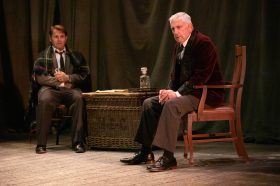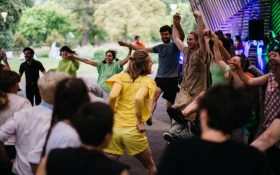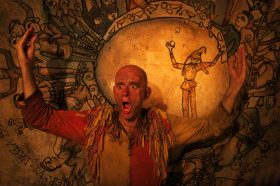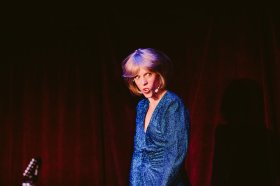Conductor, Asher Fisch with the West Australian Symphony Orchestra (WASO). Photo via WASO.
Just when you think you may have seen the best of Perth’s West Australian Symphony Orchestra (WASO), this amazing orchestra performs a hat trick with this program. Unfortunately, the title, Tchaikovsky’s Nutcracker, is a little misleading as it is only Part 2 of the whole Nutcracker story and is placed second on the program to two major works by Respighi. Perhaps many, believing it to be the complete Nutcracker, could have accounted for a few vacant seats. However, having the two composers on the same program was a master stroke bringing bells and whistles, stamping feet and cheers from the grateful audience of 99%. People even sitting behind the orchestra received a major bonus in a different view of two harps and the unique conducting style of conductor, Asher Fisch.
In fact, the influence of Fisch on the entire program was clearly obvious, not only in the comprehensive way in which the music was delivered but also in its fine touches.
While world-renowned as a conductor, Fisch is also revered for his interpretation of the Italian romantic period and, as an accomplished pianist, his appreciation of the Celesta, first used by Respighi in Pines of Rome. Respighi, seduced by the technology of his day, had also included a recording of a Nightingale’s song in Part 111 of The Pines of the Janiculum but this didn’t sit well with Fisch. Aware of the fact that a Nightingale never repeats its song, a more authentic sound was, therefore, produced by a very talented member of the huge Percussion team which played an integral part in the evening’s program.
While we depend so much on technology today it seems incredible that two such great composers as Respighi in Italy and Tchaikovsky in Russia could meet each other, with mutual respect, to exchange ideas so long ago.
Respighi’s love of the romantic period included the relaxed sounds of nature with bird whistles and the gentle rustling of the pine trees on Janiculum Hill and the Appian Way as well as boisterous behaviour of children at play in the Villa Borghese.
But Respighi, although a Romantic, did not confine his tone poem merely to joyful sounds. The history of ancient Rome was the foundation of the Rome he was so passionate about and he paid homage to the chants of medieval monks with the soulful tones of the Cor Anglais, oboes and bassoons. Massive kettle drums brought forth the sounds of marching feet in war and the eventual triumphs of victory came with resounding blasts from the brass section and the French Horns. Fisch’s expansive arms ensured that the orchestra was always synchronised and solo performers were allowed to shine and shown acknowledgement by him.
Respighi had achieved his objective of producing a work far removed from traditional Italian Opera which had been dominating the musical scene. However, likeTchaikovsky, he was longing to compose a ballet. While Rossini had retired he was happy for Respighi to use some of his short works as a basis for a new orchestration, Rossiniana, noted for the opening four notes played by the trumpet and repeated periodically throughout the piece. Respighi used the same balance of light and shade with a barcarolle contrasting with the gentle sound of the Celesta and concluding with a Tarantella unlike any other.
The delights of The Nutcracker, Part 2, which followed were the icing on the cake and it was good to see so many young people enjoying the music with those who’d been brought up with it close to a century ago. The tinkling sweetness of the Sugar Plum Fairy, again played on the Celesta, had been directed by Tchaikovsky to sound like ‘water droplets from a fountain.’ The exotic Chinese dance was expertly performed by flutes and piccolo and the seductive, mesmeric music of the Arabian dance sent shivers up your spine. Each of the eleven pieces were played to perfection, culminating with the Waltz of the Flowers, introduced so exquisitely by the two harps and joined in perfect harmony with the violins.
This evening’s concert was a combined effort by so many that It would be unfair to list any one performer in particular. What I appreciated most was the timing at the hands of Asher Fisch.
Nothing was rushed, solos were spot on, as were the cymbals. The ebb and flow of such exciting, restrained, thrilling yet gentle music was a credit to all who took part.
The love of ballet and the joys of childhood are what have brought these works of Respighi and Tchaikovsky together in a powerful union. Bravo!
5 stars ★★★★★
RESPIGHI Pines of Rome
RESPIGHI Rossiniana
West Australian Symphony Orchestra
Conductor: Ascher Fisch
23 March 2019
Perth Concert Hall





